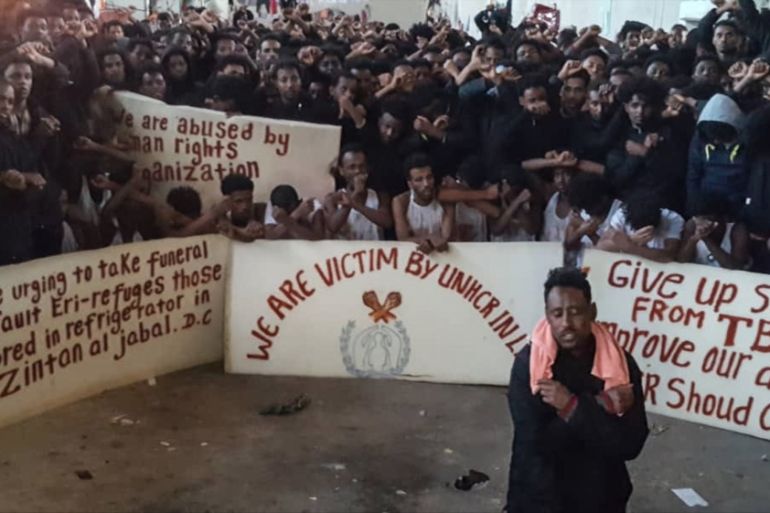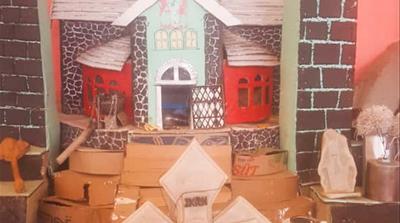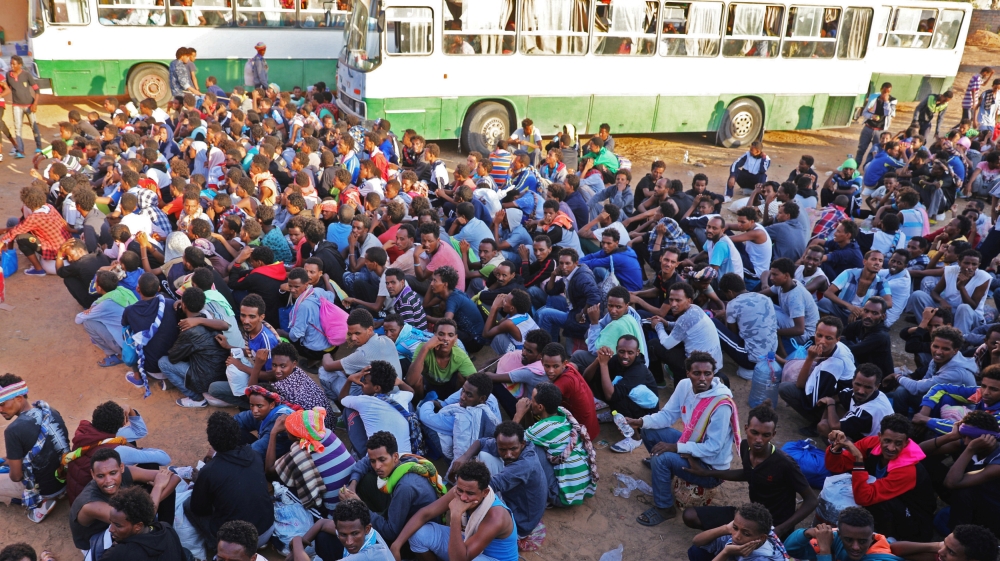‘We need urgent help’: Refugees perish in Libyan detention centre
Refugees and staff of international aid groups confirm at least 22 deaths since September in Zintan.

Refugees and migrants in Zintan detention centre, northwest Libya, have told Al Jazeera that every morning, they gather in front of a makeshift church to pray for the dead.
The place of worship is crafted from food cartons and mattress sponge – coloured red with scraps of towels, green from cut-up sheets, and white from Colgate toothpaste that was handed out in aid packages.
Keep reading
list of 4 itemsUN report charts lethal cost of migration over past decade
Conflict, climate, corruption drive Southeast Asia people trafficking: UN
Bodies of three Rohingya found as Indonesia ends rescue for capsized boat
At least 22 migrants and refugees have died in Zintan since last September, according to refugees and staff of international organisations in Libya.
Those who have perished included a Gambian father and son who died weeks apart, according to others detained there. The mother of the boy survived and was later released, they say.
Many who died are Christian and are yet to be buried because of a lack of provision for non-Muslim burials. Some bodies were stored in the detention centre before being moved to morgues in local hospitals, where they remain, according to detainees and aid workers.
Employees of international organisations working in Libya declined to comment on the record, because they could lose access to the detention centre, 180km southwest of Tripoli, which is ostensibly under the control of Libya’s Department for Combatting Illegal Migration. Speaking on condition of anonymity, one described the number of deaths as a “major scandal.”
Libyan authorities did not respond to multiple requests for comment.
Detainees still in Zintan provided Al Jazeera with a list of the names, photos and nationalities of most of the dead. Many of those who died were returned to indefinite detention by the EU-supported Libyan coastguard, after they tried to reach Europe by crossing the Mediterranean Sea.
The EU has been providing training and equipment to the Libyan coastguard for the past two years, in a bid to disrupt smugglers and stem migration to Europe, under a deal that has been repeatedly condemned by human rights groups.
In some parts of the centre, toilets are overflowing and are in urgent need of repair. As a result, solid waste and garbage has piled up inside the cell for days and presents a serious health threat
Hundreds of detained refugees and migrants were moved from Tripoli to Zintan last September, after detention centres in the capital were caught on the front lines of clashes.
The area is difficult to reach from Tripoli, because of security issues along the road, including fighting between rival militias.
Detainees in Zintan say medical aid is lacking, and – in recent weeks – when doctors visited from the International Medical Corps, the organisation charged with healthcare in Zintan, they only spoke to refugees and migrants through a small window, without entering the hall in which they are being held.
Before that, only a few detainees were allowed outside see medical workers each time they visited, while the rest were kept locked up, they say.
Refugees and migrants need treatment for tuberculosis, chest infections, anaemia, diarrhoea and scabies, among other ailments, but are only offered paracetamol and ibuprofen, they say.
“Do you think by these methods they’ll cure us?” said one Eritrean man.
The International Medical Corps did not respond to a request for comment.
Detainees say they are being fed at most once a day and water taps are opened for just 10 minutes in the morning: only enough time to pour one cup of water each, at most.
Earlier this year, after the number of bodies began to pile up in Zintan, dozens of the most unwell were moved to another detention centre in Gharyan, 113km northeast by road, according to detainees and staff of visiting organisations.
At least seven of those who were moved have also died since, say sources, including a woman who escaped Gharyan.
‘We need urgent help’
Zintan detention centre was not built for people: the hall that held the refugees was previously used for storing crops. There are currently seven toilets for more than 500 people.
An Eritrean man detained there, who communicated with Al Jazeera using a hidden phone and asked not to be named for fear of retaliation, appealed for support.
“At this moment, we need urgent help. We are in a bad condition,” he said.
Another Eritrean said: “We are sick, hungry and dying as well as being exposed to different diseases. How many people are dying in the detentions untold?”

The man said dozens of people with him have tuberculosis. Four detainees tried to kill themselves by grabbing hold of electrical wire running through the hall, before electricity was cut off three weeks ago. Fellow detainees tied their hands together to stop them from trying again, he said.
In photos and a video sent to Al Jazeera, a large pile of rubbish can be seen in one part of the hall, with insects crawling across it.
Another photo shows detainees protesting by writing on mattress sponge with tomato paste. “We need emergency”, “We are innocent refugees” and “We are being starved to death,” the signs read.
On Monday, 96 people were moved from Zintan to the United Nations Refugee Agency’s Gathering and Departure Facility in Tripoli.
In a statement to Al Jazeera, a UNHCR spokesperson said they are “deeply concerned” at the reports of deaths in Zintan, and called conditions dire.
“Living areas are severely overcrowded and lack proper ventilation. In some parts of the centre, toilets are overflowing and are in urgent need of repair. As a result, solid waste and garbage has piled up inside the cell for days and presents a serious health threat.”
More than 650 people remain in Zintan detention centre, according to UNHCR.
“A lot of people are dead within a short period. Even we are near death,” said one of the Eritreans who was left behind. “We are the victims, we need a safe life, we need our rights. For us, it is a black history. We are scared, we are suffering emotionally, psychologically.”
Refugees and migrants continue to be intercepted in the Mediterranean and brought to detention centres at a much faster pace than they are being evacuated.
In May, 1,224 people were returned to Libya by the Libyan coastguard – more than the rest of the year combined.
